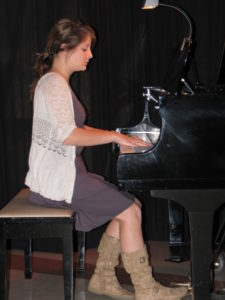We recently asked high school senior, Grace Mason who is planning to pursue a college music degree, what she thinks students need in order to have successful lessons and practice. Here’s what she told us.
- Positive Mindset. Maintaining a positive attitude when learning new and challenging music can make all the difference! Even when you’re having a bad day, taking a moment to “adjust your attitude” at the start of a lesson or practice session is important to do. The great thing about music is that it often puts us in a better mood, and tackling a challenging piece with a little determination can help us make great progress.
- Using Time Wisely. As music students, we’ve all done it. We’ve used our practice time to play through our favorite pieces and songs without structuring time to do actual practice. We’ve “practiced” while daydreaming or letting our minds wander. Being mentally present and using practice time wisely are crucial to learning new material and building technique. Ways to structure time for optimum practice include:
- Making time to practice when feeling alert. Example: Waking up 10 minutes earlier to practice scales or 2-4 challenging measures in piece instead of practicing late at night after a long day of school and other activities.
- Focusing on assigned practice material first. Example: Use fun songs that you like to play for rewarding yourself after you first practice a newly assigned piece.
- Writing out practice goals for each session. Example: C major scale, 1 octave, hands together, 3 times. Bach prelude, first 4 measures, left hand only, 5 times. Etc.
- Setting Goals. Setting goals is an integral part of any learning process. When learning how to play an instrument, the small goals are just as important as the big goals. Small goals, like those outlined under “Using Time Wisely,” help music students reach their larger goals such as memorizing an entire piece or performing at a recital.
- The Right Music. At some point, every music student has had to learn a piece that she didn’t like. This doesn’t mean that the piece wasn’t right for her; and most likely, her teacher had a purpose for assigning the piece. Having the right music doesn’t mean that we’ll always love the music. It does mean that we are learning music that challenges us and grows our musicality and technique. Being open to a wide variety of composers and styles helps us to become well-rounded musicians.
- Metronome. Is it true? The metronome is our best friend? Well, it may not be our best friend, but it sure can make us better. Instead of dreading the obstinate clicking of the metronome, embrace it! Make practice with a metronome into a game to see if you can stay with it, or pretend it is the drummer in your band. Having a positive mindset about the metronome in addition to your practice is like doubling the fun.
Contributed by Grace Mason, piano student at Metro Music Makers and high school senior
